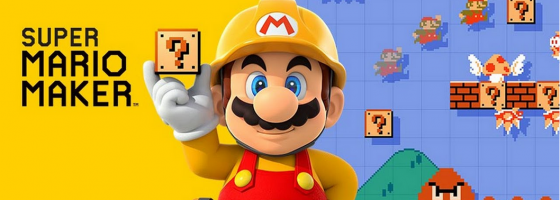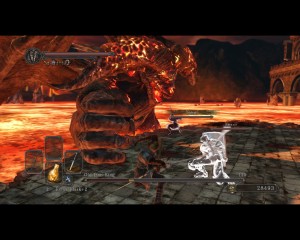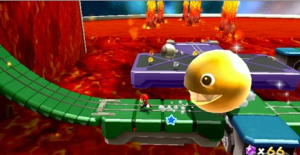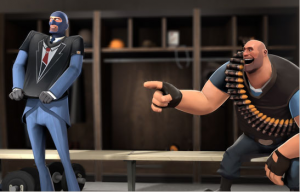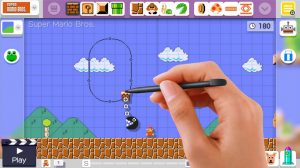Super Mario Maker has been a fascinating game to “play” since its release in September, and I say “play” because I spent the majority of my time building levels. It’s been a long time for non programmers to have access to an editor designed for them and along with myself; a lot of people are jumping on the making bandwagon. As I dug deeper into the editor and the offerings put out, I came to realize and reaffirm some important elements about game design that were too good not to talk about further, and something that Nintendo has known about for years.
Building Basics:
Jumping into Mario Maker is incredibly easy, thanks to the visual design implemented by Nintendo. Items, characters and elements can be simply dragged and dropped and they perform exactly how they would in other Mario games. The toolset allows for someone to quickly put a level together, fill it with enemies and constantly iterate as they go.
You can also combine characters and elements to create things that are original to Mario Maker, but still retain the same elements as the previous games. This has led to the sheer variety of levels, from game developers to students and everyone in between. One of the more understated elements of Mario Maker is the simple quality control that Nintendo has built into it: All levels must be completed by their creator before uploading.
Now, that doesn’t sound like a huge deal, but it’s actually very important to the first lesson and something that I’ve come to realize over the years.
1. Difficulty Doesn’t Equal Greatness:
Over the last five or six years, there has been a real surge of challenging games on the market: Super Meat Boy, Demon’s Souls, FTL and so on. Many gamers have proclaimed this as great and a throwback to the days of classic games that were meant to be brutally difficult. This has led to fans judging a game’s quality simply on the difficulty of the title and looking down on anyone who criticizes.
With that said however, Mario Maker is a great example that contradicts that sentiment. In 30 minutes, I could design a level so difficult that .001% of the entire audience in the world would be able to beat it and it would still take me awhile to actually beat it so that I could host it.
Thanks to the analytics in Mario Maker, you can see the exact height and distance of Mario’s jumping ability and from there you could build pixel exact challenges and leaps; along with setting up off screen traps to kill the player.
The level would be so difficult that the only way you would win it would be if you knew where all the traps were (aka be the developer) or spend a lot of time dying and failing until you get it right.
Would this be challenging? Yes. Would this be something for the hardcore elite? Yes. But would this be something enjoyable? The answer to that is no. There are plenty of levels like that in Super Mario Maker now; full of death traps and situations beyond even the levels featured at the Nintendo World Tournament from E3 last year.
However, it’s not interesting to play a level explicitly designed to be over the top difficult with nothing to compensate for it. Instead of exploring a level’s design to figure it out, you’re just banging your head against the wall until either you or it breaks. When a game or level feels like the product of a developer going overboard with difficulty for the sake of being difficult, it shows a lack of understanding of game balance.
One common annoyance I see in Mario Maker levels is people setting up invisible blocks purposely to cause someone to die on their first try through a level; it’s a cheap trick that offers no understanding or growth from the player’s end.
Games like Demon’s Souls and Super Meat Boy were great aside from their difficulty; both featured skill rewarding gameplay and were balanced in their difficulty. Demon’s Souls had permanent shortcuts to unlock and upgrading gear while Super Meat Boy levels were never long enough to turn into ordeals.
Now I know what you’re thinking, “Then easy levels are better, right?” While extreme difficulty can ruin a game, so can extreme easiness.
2. Engaging the Player with the Design:
Games that are too difficult feel frustrating to play and turn people off, but games that are too easy have their own problems. We all like to feel great by beating a level or a game, but not when it’s metaphorically handed to us on a silver platter. When the level is simply set up to be patronizing and offers nothing to the player, then it feels like a waste of time.
Another part of this is not locking down the elements of your level and leaving holes that can break it. There’s a huge difference between having a short cut for expert players to avoid or mitigate a challenge, and leaving a part of your level open that allows someone to simply avoid almost everything you built and head straight to the goal.
It may seem like a reward to the player, but all you’re doing is rendering your entire level moot in favor of an easy win. One thing I see with some Mario Maker levels is that the creator makes some elaborate trap or obstacle, but leaves some massive hole either due to an item or Mario’s jumping ability that makes the entire section skippable.
This is where things get a little philosophical; a good level should make the player grow by the end of it in some way. They should be different than they were at the beginning; this could mean getting new powers, improving their skill or even just getting an achievement.
The point is that the player should feel that they didn’t just waste their time, and this could be any number of feelings: The level was too hard that they’ll never use those skills again, the level was too easy that it felt like busy work, the level was a repeat of a previous challenge and so on.
Our next lesson brings these points together for one of the hallmarks of a great game designer.
3. There’s Harmony in Great Design:
Perhaps the hardest thing to come up with as a game developer even beyond balancing difficulty is deciding just what your level will be about. It’s very easy when it comes to designing something to just throw everything that you can think of into a level or game. We see this not just in Mario Maker, but with game developers who go overboard thinking that more is better.
One of the big lessons I’ve learned from talking to game developers and doing work in Mario Maker is that a great stage (or game) should be a well oiled machine; every element should have a function. A very, very big case in point would have to be Super Mario Bros World 1-1 and how the team created a level that went through all the basics of the gameplay without needing one tutorial. This is where the concept of having harmony or a unified theme comes in for what your game/level in about.
Are you making an underwater obstacle course? Jumping through fire? Dealing with enemies via shells? Just like with a full game, you need to come up with the foundation of your level and have everything flow from there. If your level is about tricky platforming, throwing in a bunch of enemies or an underwater section at the halfway point won’t make sense.
One of the more common types of levels in Mario Maker are those that just throw enemies randomly around the stage or leaves an enemy in such a way that they act as a surprise attack. While that may be unexpected, it clashes with the rest of the challenges that you have designed and makes the level seem stitched together.
This is a point that Nintendo has perfected over the last few decades, especially with the Mario titles. Each stage in a Mario Game offers some unique take on the gameplay and if there are any repeated game mechanics or obstacles, they will be used in a different way to keep things from being repetitive.
Two of the finest games from Nintendo would be Mario Galaxy 1 and 2; both featured amazing design that kept on changing and growing over the length of play.
For our final point, we come to one area that every game designer has trouble with.
4. Knowing When to End:
Building off of the last point, once you have the foundation and mechanics down, you need to know just how much you can get out of them. Every mechanic and game system has a limited span that they will keep the player’s interest and that you as a designer can make use of. Some of the best levels and games for that matter don’t outwear their welcome.
The more unique or niche your game mechanics or challenge are, the less overall time that you can get out of them. The reason is that games with complex or different mechanics require a lot more work to create challenges suitable to them, and the unique mechanic also limits the number of ways you can create interesting challenges.
Portal is a perfect example of this. The portal gun is one of those mechanics that sounds like it has an unlimited number of uses for stage design, except it really doesn’t. If you look at the forms of manipulation, you only have a few mechanics that make use of the portal gun: Interacting with objects, controlling the player’s momentum and moving the player or objects around.
This is why despite how original Portal was, the game was only a few hours long and the same could be said for Portal 2’s campaign, but it had added mechanics in the form of the gels. Creating a challenge that not only makes use of the portal gun, but is different enough from previous stages to warrant its creation is very difficult. It would have been very easy for Valve to just keep creating puzzles and repeating concepts and mechanics to extend the life of the game, but that would have made things very repetitive and hurt Portal’s success in the long run.
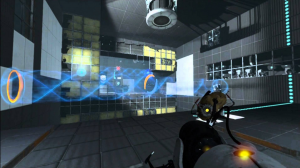
Portal 1 and 2 both featured unique game mechanics that didn’t outwear their welcome because the developers never repeated the same exact challenges and puzzles
This is also why we see many casual or games with straightforward gameplay have tons of levels to them, because the mechanics can be translated to a wide variety of situations with minute differences to keep things going.
With that said, if the differences are too small, then you once again run into problems of repetitive gameplay.
Taking this back to Mario, one of the best things about Mario level design is that the stages never overstay their welcome; this is due to the pacing and implementation on Nintendo’s part.
With Super Mario Galaxy, each stage is only a few minutes long and is just enough to showcase the level’s unique design or situation before they would have to repeat it or try to extend it. Too often we see developers pad out a game with recycled content and all it does is hurt the game as a whole; for many people it’s better to have an amazing one hour of play as opposed to three just okay hours.
Super Meat Boy once again can be used as an example here with its level design. Each level could have been stretched out repeating the same mechanics present to offer longer challenges, but the developers instead went for as straightforward of an execution as possible. In this way, you’re in, you’re out and you move on to the next challenge in the blink of an eye, this is because Team Meat knew that their gameplay could not be stretched out and be as varied and as long as the levels in any Mario game.
If you have variations of the design or challenge to use, then use them, but don’t repeat the same situations simply to make your level or game bigger. As we talked about with harmony in game design, a good game designer knows when they’ve taken things to their limit and ends it.
Another knock against some Mario Maker levels is being overloaded with difficult and different sections, to the point where the level feels like it’s never ending; where you have one very long level that could have easily been three regular sized levels. Proper pacing is vital to keep someone engaged for the long haul and if you have too many different challenges in one level, then break it up into multiple levels if the design warrants it.
These four points may sound simple to everyone reading it, but game developers around the world still struggle with one or multiple of them and it’s what distinguishes an amazing game developer and why I still love Nintendo.
30 Years of Excellence:
It’s common for people to criticize Nintendo when it comes to their reliance on branding and saying that they never innovate, but that can’t be further from the truth. Playing and designing stages in Mario Maker has given me a real appreciation for the craftsmanship that Nintendo puts into their games. For me personally, the design that Nintendo uses in their Mario games is a work of art and something that should be studied.
As I created levels in Super Mario Maker, the ones that were the most popular weren’t the hardest or the longest, but levels built around the lessons I talked about. In fact, my most popular level doesn’t even involve platforming, but a level built around solving math problems.
Great game design is one of those elements that we all know it when we see it, but actually describing how it works can be difficult. These lessons should give you a great foundation into building not only your own levels, but thinking about game development as a whole.

